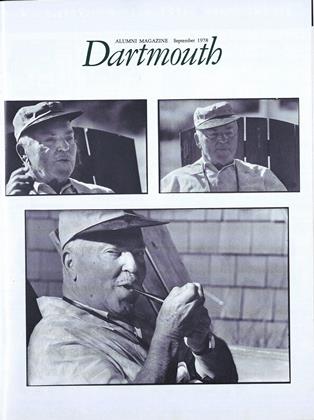REUNION SEMINAR
In "Men, Women, and Work," Mary Potter Rowe, special assistant to the president and chancellor of presented some interesting statistics about the oft-neglected majority of "mankind" - women and children. In the process, she exploded the cherished American notion that most women don't work.
After stating flatly that mothers are by definition working women, Rowe pointed out that more than half of the women in this country are also in the paid labor force. "Fewer kids are being had," she explained. "Women are increasingly going out into the paid labor force, more single-parent households are occurring, more women are family breadwinners, and much, much less housework is being done in America than in the past." She speculated on the meaning of these trends.
"It could be grim," she said, "if it means that nobody is to be at home caring for the children. Will the more visible and condoned skills of men become the norm and the despised activities of women and children go by the board, so that fewer children are had because of a cultural abhorrence of the very young? Will those children who are born be left too much alone? Will there be no one left to be nurturant? That is a tragic vision - a society where people do not take care of each other."
But Rowe's statistics suggested that this is not, in fact, where America is heading. Not only, apparently, are many women moving out of the home, but also some - a few - men are moving in. "Twenty per cent of the childcare in 1978 is being done by men," she pointed out, "which is a rise from some five per cent in the late fifties and early sixties. And of the nurturing jobs traditionally assigned to women - childcare, nursing, early childhood schooling - five per cent are now occupied by men, and the figure is rising."
Optimistically, Rowe sees the possibility of a society in which each sex has more options than either has at present. In the near future many men and women may well develop three sets of skills each: paid employment skills, family employment skills, and volunteer (outside-the-family) employment skills. Rowe expects the world will come to provide more possibilities for men to have experience and work which involves caring for other people - children, the aged, the dependent.
Rowe's audience quizzed her about corporate daycare, the effects of daycare on children, the effects of the Equal Rights Amendment on the economy and the family, and the validity of childcare as an occupation for retired people. Rowe, a daycare expert, replied that corporate daycare is "extremely expensive," but that partial daycare reduces absenteeism and induces loyalty to the breakeven point. The upshot, she said, of the many studies on the effects of daycare is that by the age of five it is impossible to see any difference at all between children who have been in daycare and those who stayed at home with mummy. Rowe felt that the main immediate effect of ERA would be to make even more options open to men. Finally, she spoke of her own 82-year-old mother, a retired professor, who spends her mornings happily volunteering in a daycare center. "As to retired men," she said, "there are almost none involved in daycare."
 View Full Issue
View Full Issue
More From This Issue
-
 Feature
FeatureA Company of Stretchers
September 1978 By Cay Wieboldt -
 Feature
FeaturePoet at Full Ahead
September 1978 By Charles G. Bolte -
 Feature
FeatureTHE RIVER and THE DAMS
September 1978 -
 Article
ArticleA Journey: Five days to Big Rapids
September 1978 By Dan Nelson -
 Article
ArticleDickey-Lincoln: Who wants it? Who needs it?
September 1978 By Greg Hines -
 Article
Article'A Spirit of Fire and Air'
September 1978 By NARDI REEDER CAMPION







